January eNews
Local Government Leaders of Bumthang, Mongar, and Samdrupjongkhar enhanced Public Speaking and Media Literacy Skills
In a series of intensive two-day training workshops, local government (LG) leaders of Bumthang, Mongar, and Samdrupjongkhar strengthened their public speaking and media literacy skills. Organised by the BCMD with support from the Canada Fund for Local Initiatives (CFLI), the training aimed to foster gender-inclusive leadership and equip participants with essential communication tools to engage effectively with their communities.
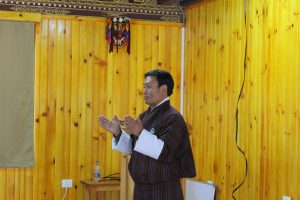
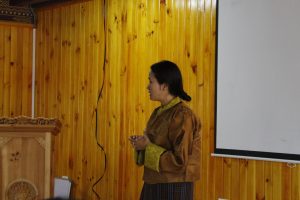
The programme began in Bumthang on 4th and 5th January with 20 local government leaders, comprising both men and women, focusing on public speaking and media literacy. A key objective was to enhance the capacity of female leaders, enabling them to confidently engage with their male counterparts and actively participate in community governance. Male participants played a crucial role in promoting gender inclusivity, supporting their female peers, and reinforcing the benefits of diversity in political engagement and discourse.
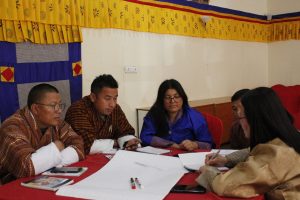

Following the training in Bumthang, the workshop continued in Mongar and Samdrupjongkhar from 6th–7th January and 9th–10th January, respectively. Around 40 LG leaders, both men and women, participated in the sessions, which covered crucial aspects of media literacy, including identifying fake news, disseminating accurate information, and preventing the spread of misinformation. With the growing influence of digital platforms, these skills are vital for ensuring effective communication and responsible information-sharing within communities.
Empowering women to participate actively in the democratic process remained a core focus of the training. Female leaders were encouraged to serve as role models, inspiring other women to engage in local governance and consider standing in the upcoming LG elections. Male participants also gained insights into the importance of fostering gender-balanced leadership and their role in supporting inclusivity in decision-making processes.
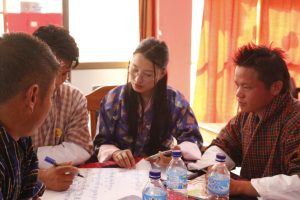
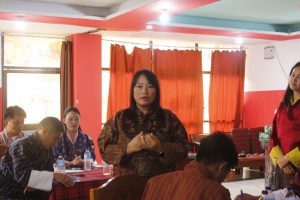
To ensure the sustainability of the training’s impact, participants developed action plans tailored to their local contexts. These plans outline strategies for disseminating newly acquired knowledge within their communities and identify capacity-building needs for aspiring LG leaders. By proactively engaging potential candidates before and after elections, the initiative aims to strengthen democratic governance and build competent, inclusive leadership at the grassroots level.
Through such efforts, Bhutan moves closer to achieving a more inclusive and participatory democracy, where diverse voices contribute to effective governance and community development.
Empowering Journalists through Transformative Workshop
A five-day training on journalism was held from 6th to 10th January in partnership with DW Akademie (DWA), under the project Building Inclusive Democracy: Civil Society, Parliamentarians, Media, and Youth Strengthen Good Governance in Bhutan. It brought together 19 journalists from diverse media houses, fostering collaboration, skill-building, and a deeper understanding of the profession’s evolving demands. From distinguishing facts from opinions to mastering multimedia reporting, the workshop equipped journalists with tools to create impactful and solution-oriented stories.
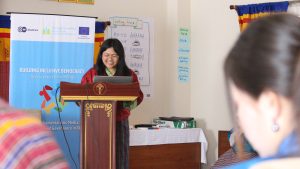
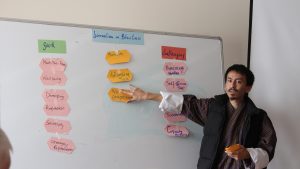
The training aimed at enhancing skills in constructive journalism, multimedia reporting, and ethical practices. The interactive sessions opened with personal introductions and expectations, setting a collaborative tone for the programme. Participants explored key journalistic principles, such as distinguishing facts from opinions, fact-checking, and avoiding misinformation. Discussions also highlighted the ethical responsibilities of quoting netizens and addressing the challenges posed by fake accounts.
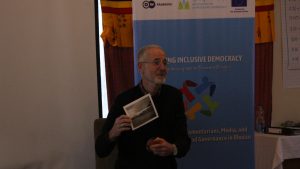
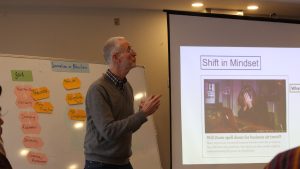
Multimedia reporting combined with practical exercises took participants through a process of showcasing how text, visuals, and videos can be applied to craft impactful stories powered by knowledge and skills in composition, headline writing, and evaluating news values such as timeliness, impact, and conflict. They also explored the evolving media landscape in Bhutan, reflecting on the strengths and challenges of journalism in the country. Constructive journalism emerged as a transformative approach, encouraging participants to shift from problem-focused narratives to solution-oriented storytelling, using the Positive emotions, Engagement, good Relationships, Meaning and Achievement (PERMA) method to identify positive angles.
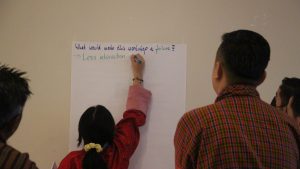
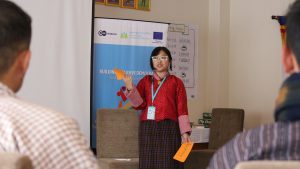
Emphasis was also placed on avoiding sensationalism, ensuring balanced reporting, and inspiring audiences through hopeful narratives. Equipped with new skills and perspectives, attendees left the workshop with a renewed commitment to ethical, impactful journalism that informs and empowers communities.
This project is funded by the European Union.
Training of Trainers on Media and Information Literacy
The five-day Media and Information Literacy (MIL) Training of Trainers (ToT) for Media and Democracy Club (MDC) coordinators from eight schools and Sherubtse College was successfully held from 13th to 17th January. The training is conducted in partnership with DW Akademie under the project Building Inclusive Democracy: Civil Society, Parliamentarians, Media, and Youth Strengthen Good Governance in Bhutan. The training aimed to equip coordinators with the knowledge and skills to foster media literacy and active citizenship among students in their respective schools and institutions.
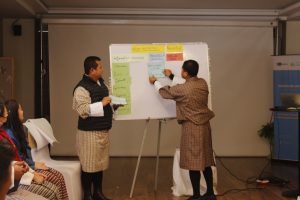
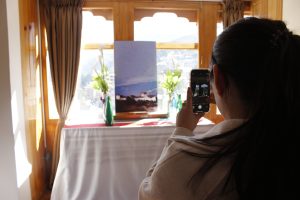
Participants engaged in trainer- and trainee-centred methodologies, gaining hands-on experience in news writing, vlogging, photo-story creation, and understanding the components of news. They also explored critical concepts such as disinformation, misinformation, information disorder, and propaganda through interactive sessions. Using a learner-centred approach, participants deliberated on objectives for the future of MDCs in their institutions, while brainstorming ways to collaborate with Bhutan Centre for Media and Democracy (BCMD) to ensure the sustainability and success of these clubs.
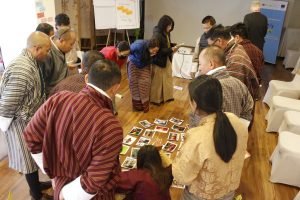
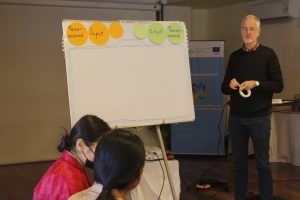
The training introduced the Access, Analyse, Create, Reflect, and Act (AACRA) framework to help coordinators critically engage with media. Discussions on citizen journalism covered its historical development, opportunities, risks, and mitigation strategies. The workshop was designed to equip the coordinators with the knowledge and skills necessary to promote media literacy, fostering active citizenry among youth and empowering them to engage responsibly with media.
BCMD expressed gratitude to the European Union, the Department of Education Programmes, and the participating institutions for their support. The initiative aims to inspire young people and strengthen democracy through enhanced media literacy and civic engagement.
This project is funded by the European Union.
